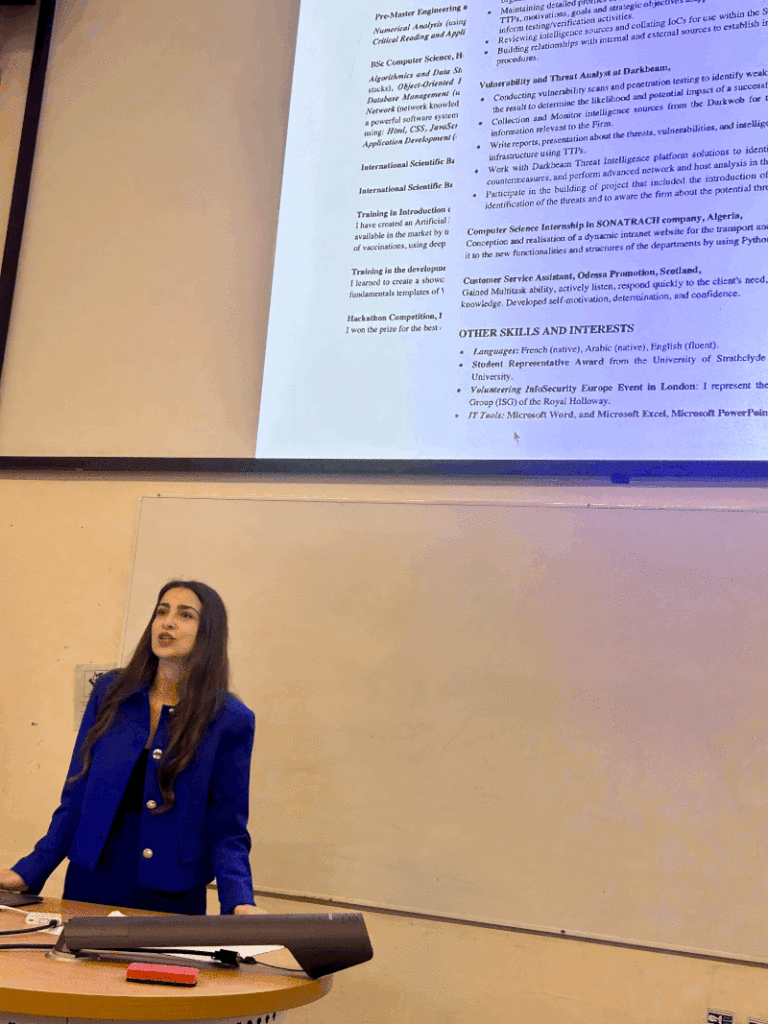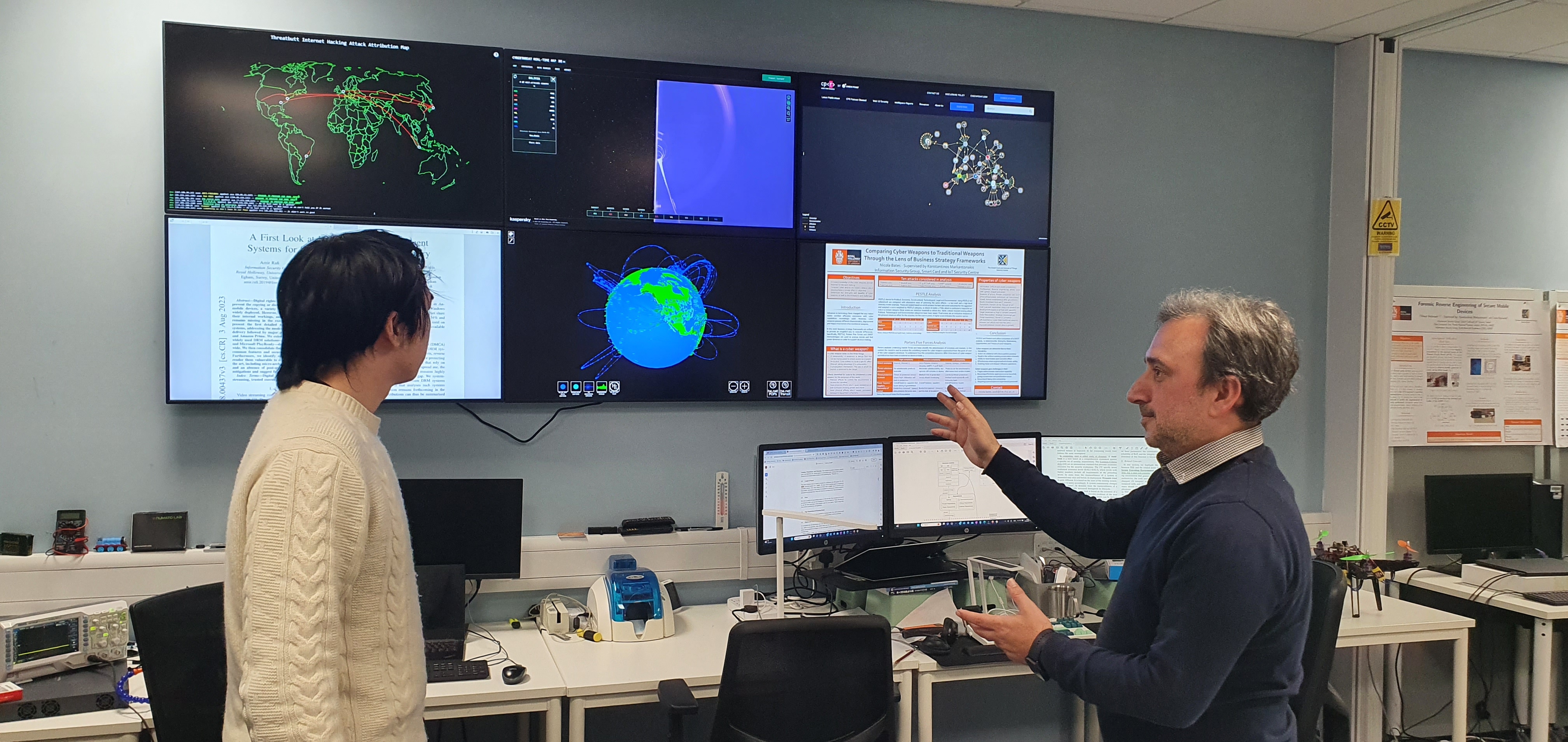The digital landscape can be a battlefield. Every click, swipe, and tap potentially generates a trail of data, ripe for exploitation by increasingly sophisticated cybercriminals. For instance, in 2021, a massive data breach at LinkedIn [1]exposed nearly all its users, highlighting the vulnerabilities of our interconnected world. The financial impact is huge, with cybercrime projected to cost the global economy US$10.5 trillion annually by 2025. [2]
In this ever-evolving environment, the need for cybersecurity experts is paramount. Royal Holloway, University of London‘s Information Security Group (ISG) is a world leader in the field, with over 35 years of experience and a pioneering track record for focusing on practical solutions. Their dedication has won many accolades — the ISG is a UK Government Academic Centre of Excellence in Cyber Security Research (ACE-CSR) and holds a gold award from the National Cyber Security Centre (NCSC) as a UK Academic Centre of Excellence in Cyber Security Education. Its Information Security (MSc) programme is NCSC-certified, and ISG members contribute to the UK’s Cyber Body of Knowledge (CyBOK), the benchmark for the UK’s cybersecurity curriculum.
Little wonder then that many choose Royal Holloway for advanced studies in this field. Just ask Rupok, a recent graduate of the MSc programme.
“From my research on universities, I became confident that Royal Holloway is one of the great places to learn cybersecurity,” he says. “I wanted to engage with different cybersecurity conferences and seminars which Royal Holloway enabled me to do. I discovered that my decision was wise when I found that the entire ISG is helpful in upskilling their students and opening many doors for them.”

Rupok enjoyed all the modules he took in the MSc programme thanks to the significant level of detail that went into each topic. Source: Royal Holloway, University of London
The MSc programme offers a unique blend of breadth and depth. Designed to adapt to the ever-changing cybersecurity sector, it welcomes students from diverse backgrounds, creating a vibrant learning environment enriched by varied experiences. The curriculum itself is inherently interdisciplinary, allowing students to focus on a vast array of areas, from law and regulation to fraud detection and critical national infrastructure security. It’s an approach that has earned the programme recognition as one of the broadest information security programmes globally.
Lilia, another graduate, can attest to this. “Studying at Royal Holloway helped me figure out which area of cybersecurity I’m most passionate about,” she says. “While my computer science bachelor’s gave me a general idea of cybersecurity, doing my master’s at Royal Holloway exposed me to various courses covering different industry areas, which clarified my interests.”
Course content is continually refined based on insights from industry and government partners and the ISG’s cutting-edge research projects. This, paired with an extensive alumni network, ensures students have relevant and up-to-date knowledge and skills for careers across diverse sectors. And as the faculty comprises specialists in computer science, engineering, mathematics, statistics, and social sciences, students get a well-rounded perspective on which professional pathway will serve them best.
“The majority of the modules were taught by veterans in this domain with years of teaching experience,” Rupok says. “Each course included significant detail about the relevant topic and the library is rich with required study materials to gain further knowledge.”

Lilia believes that Royal Holloway is a great choice for anyone looking to study Information Security at university, as it will open many doors in the industry. Source: Royal Holloway, University of London
Beyond technical expertise, the programme delves into the industry’s legal and commercial aspects. Students have the opportunity to complete a supervised dissertation and benefit from lectures and seminars delivered by up to 50 guest speakers annually, including alumni and industry partners. This builds valuable connections that can shape future careers. What’s more, students have access to cutting-edge resources like virtualisation software for network security experimentation, a Penetration Testing Laboratory, and an industry-sponsored Smart Card Centre.
Beyond academics, Royal Holloway cultivates a supportive environment. Each student is assigned a dedicated personal advisor to guide them throughout their studies — something Lilia knows well. “I found the lecturers were very supportive, offering broad insights and answering questions beyond the course material,” she says. “Another special aspect of Royal Holloway was having a personal tutor who ensured I had all the necessary support for both personal and academic challenges.”
Rupok agrees. “From the head of the information security department to the support staff in the School of Engineering Physics and Mathematical Sciences, everyone was immensely helpful and supportive,” he says.
The skills acquired through this programme such as data handling, analysis, problem-solving, and research unlock a diverse range of high-level career paths and provide a strong foundation for pursuing a PhD. Graduates have gone on to forge successful careers in banking, telecommunications, security consultancies, government agencies, public utilities, and the retail sector.
“Royal Holloway’s Information Security course doesn’t only take students somewhere, it opens a whole new world for them to explore further,” Rupok says. “Any student can achieve more and know that the whole ISG will be there to support them, not only during the course but for the rest of their lives.”
The MSc programme offers flexible options: one year full-time, two years part-time, or three to five years through Continuous Professional Development (CPD), as well as a two-year full-time pathway which includes a year in industry. Learn more about the Information Security (MSc).
Overall, studying an MSc in Information Security at Royal Holloway can provide you with a high-quality education, specialised knowledge in cybersecurity, and industry connections to send your career soaring, with the added advantage of membership of a highly sought after worldwide network of professionals.
Follow Royal Holloway, University of London on Facebook, X, Instagram, Linkedin, and YouTube
[1] https://www.linkedin.com/pulse/linkedin-data-breach-700m-2021-david-sehyeon-baek–ex85c/
[2] https://www.forbes.com/sites/forbestechcouncil/2023/02/22/105-trillion-reasons-why-we-need-a-united-response-to-cyber-risk/












